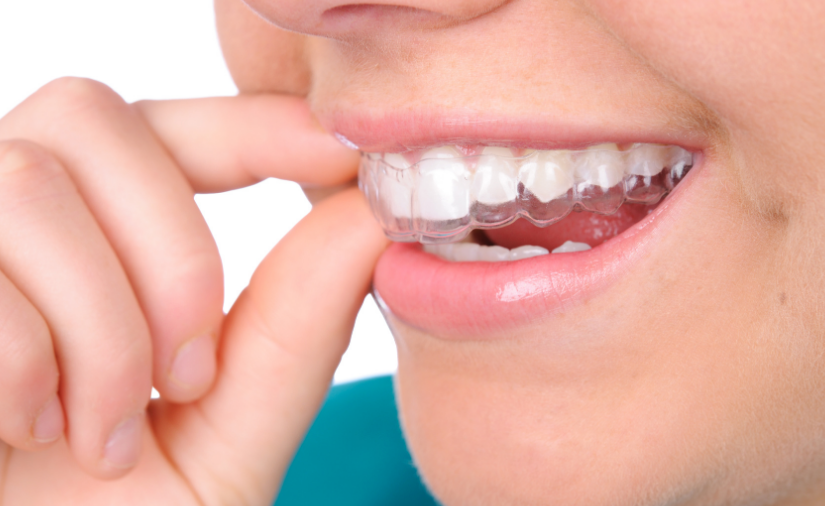By: Dr. Elizabeth Eggert
A hot/cold compress can provide temporary relief from TMJ discomfort but realigning the jaw and bite often requires a bolder approach. If Dr. Elizabeth or Dr. Jeff determines that your jaw discomfort is the result of TMD, they will create a customized treatment plan for you. More than likely this plan will include a TMD appliance, usually called a splint. Let’s explore the different types of TMD appliances and the benefits of each one.
Common TMD appliance choices include:
Over-the-counter mouthguard
Because they’re available over the counter, these mouthguards can be an affordable option. Unfortunately, because they’re not custom-fit for your mouth, they usually are uncomfortable and difficult to wear while you sleep. They tend to be very bulky and many people find that these mouthguards cause them to grind their teeth more. An OTC mouthguard might be ok as a very short term or emergency alternative to more therapeutic options.
Custom-fit mouthguard or softguard
A custom-fit softguard is fit to your specific teeth and is soft and squishy to bite into. While they can provide some jaw support and are appropriate in certain situations, they are very easy to clench into and can make muscle issues worse.
Essix retainer
After orthodontic tooth movements, it is ideal to wear a retentive device to help keep your teeth in position. An essix retainer is a thin, clear, plastic appliance that is custom-made to your teeth (shown above). At Eggert Family Dentistry, we take impressions of your teeth and fabricate an essix for you within just a few days. Essix retainers do not provide much support for the joints or muscles and therefore do not typically help manage TMD, however, they can be the right choice for some situations. In cases of severe bruxism, these may wear out quickly.
Custom nightguard
Custom nightguards are thicker than Essix retainers and are effective in helping with severe clenching and grinding problems. Because they’re custom-made, they are more secure than over-the-counter mouthguards. These nightguards have a hard exterior and are especially helpful in protecting the teeth against bruxism.
Anterior deprogrammer
This acrylic appliance helps keep your muscles more relaxed and therefore allows a healthy TMJ to also find a relaxed position. An anterior deprogrammer keeps all contact on the front teeth so the strong chewing muscles can’t fire as intensely. This allows for a deprogramming of muscles and can be especially effective at managing headaches and other muscle maladies.
TMD (sometimes called neuromuscular) orthotic
This acrylic appliance helps reposition the jaw by not only supporting the muscles, but also damaged TMJ(s), and is effective in alleviating TMD symptoms. In some cases, this appliance even moves the mandible into a new, more comfortable position. The neuromuscular orthotic can be worn all day and night, but generally not during mealtime.
Seattle protocol appliance(s) for sleep and airway issues
The Seattle Protocol is a method to determine if sleep and airway play a role in your TMD symptoms. It is common for stress hormone to build in the body if you’re not getting good air exchange and/or if your body isn’t getting the restorative sleep it needs. At Eggert Family Dentistry, the Seattle Protocol starts with baseline sleep information. Then, we work you through trial splints to open the airway space available in the mouth, both horizontally and vertically. Once your sleep improves, we often see improvements with TMD symptoms as well. Most often, you then have a final splint fabricated based on trial splint results.
Sleep appliance for apnea or other sleep related breathing disorders
A sleep appliance for apnea typically pulls the jaw into a forward position to increase airway space. These appliances can change the bite with long-term use and therefore are only fabricated after careful consideration and often after conversations with your medical doctor and after moving through the Seattle Protocol at Eggert Family Dentistry.
At Eggert Family Dentistry, we treat TMD cases with the appropriate appliance for you. This not only can lessen the effects of teeth grinding and deprogram incorrect muscle patterns, but can improve your overall quality of life. We may also integrate behavioral and muscle therapies that help you use your jaw muscles differently. Often after managing the TMD, we can also make changes to the teeth for full-time relief of your symptoms. This may include suggestions from Dr. Elizabeth or Dr. Jeff for full-mouth reconstruction, orthodontic treatment, or equilibration.
Do you still have questions about TMD? Are you concerned you’re experiencing symptoms of TMD? Give us a call at 651.482.8412. Dr. Elizabeth or Dr. Jeff would be happy to speak with you or see you in our office!
